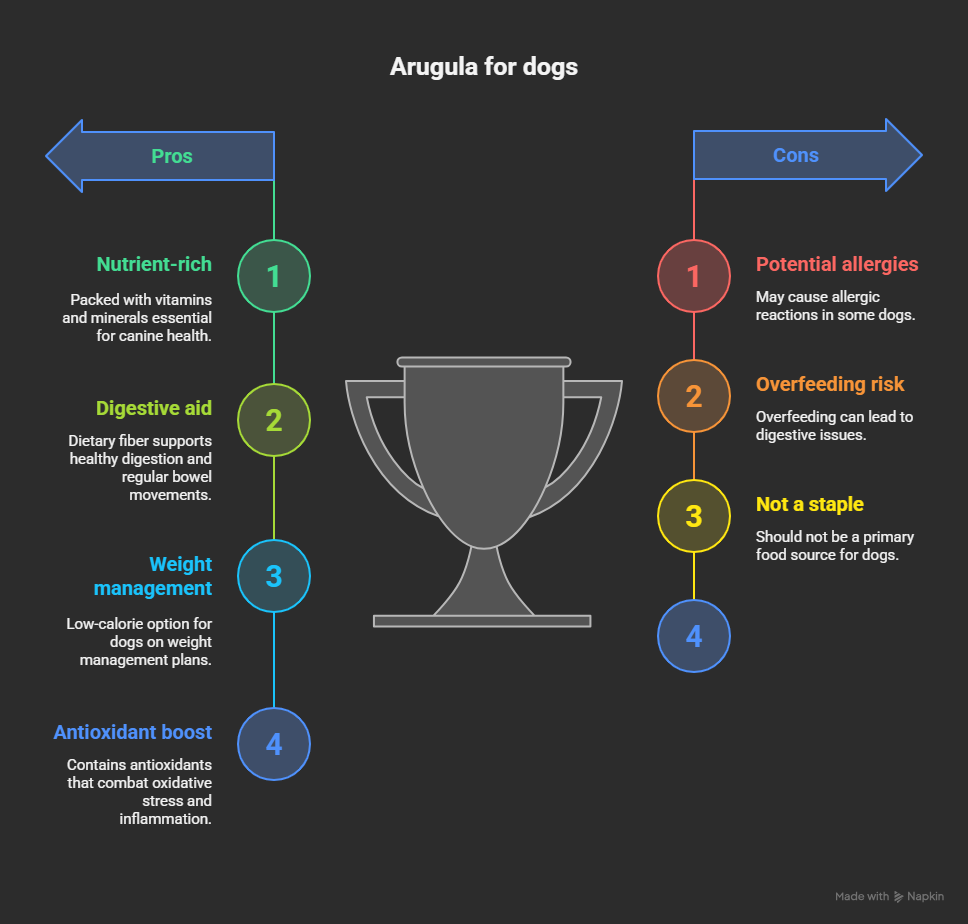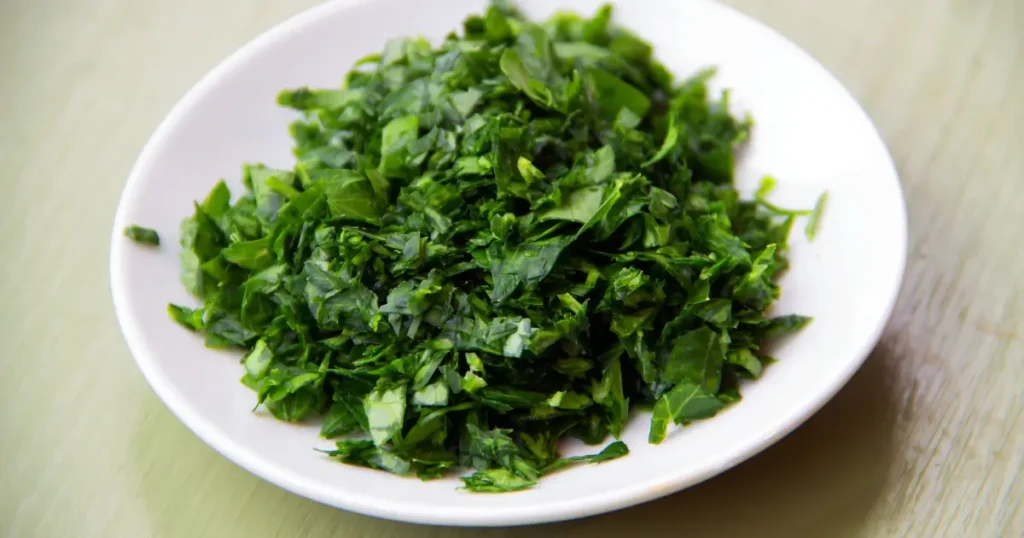Can Dogs Eat Arugula: 7 Essential Health Facts Revealed
If you’re a salad enthusiast who enjoys the distinctive peppery taste of arugula, you might wonder if this leafy green is something you can share with your canine companion. Can dogs eat arugula? Fortunately, dogs can safely eat arugula in moderation. This nutritious green offers several potential health benefits, though there are also important considerations to keep in mind before adding it to your dog’s food bowl.
When investigating whether dogs can eat arugula, it’s important to understand that as pet parents, we’re always looking for ways to enhance our dogs’ diets with wholesome, natural foods. The question of whether dogs can eat arugula is part of the broader consideration of which human foods are safe for your four-legged friend, which is essential for maintaining their health and preventing potential digestive issues. Let’s explore everything you need to know about feeding arugula to your dog.
To discover more nutritious vegetables and fruits that can safely be included in your dog’s diet alongside arugula, explore our complete guide to safe fruits and vegetables for dogs.
Table of Contents
Can Dogs Eat Arugula?
If arugula is prepared correctly and given sparingly, dogs can safely consume it. This is for pet owners who are curious about whether their dogs can consume arugula., It’s reassuring to know that, unlike some human foods that are toxic to dogs, arugula is non-toxic and can be a nutritious addition to your dog’s diet. Also known as rocket or rucola, arugula is a leafy green vegetable with a distinctive peppery flavor that belongs to the Brassicaceae family.
When researching whether dogs can eat arugula, you’ll find that for dogs who enjoy crisp textures and varied flavors, arugula can be an interesting addition to their meal routine. However, it’s important to note that not all dogs will enjoy the strong, peppery taste that makes arugula distinctive. Some dogs may turn their nose up at it, just as some humans find its flavor too intense.
While investigating can dogs eat arugula, remember that it should never replace their regular balanced diet but rather serve as an occasional supplement. Your dog’s primary nutrition should always come from high-quality dog food formulated to meet their specific needs.
Nutritional Benefits of Arugula for Dogs
If you’re asking “can dogs eat arugula?” because of its nutritional profile, you’ll be pleased to know that arugula offers several nutritional benefits that can support your dog’s health when included as part of a balanced diet:

Vitamins and Minerals
When researching can dogs eat arugula, you’ll discover it’s packed with essential nutrients that contribute to overall canine health:
- Vitamin A: Promotes cell growth, immunological response, and vision.
- Vitamin C: Promotes immune function and serves as an antioxidant.
- Vitamin K: Vital for healthy bones and appropriate blood coagulation
- Folate: Important for cell division and healthy growth
- Calcium: Supports strong bones and teeth
- Potassium: Supports healthy muscle and fluid balance.
- Iron: Critical for red blood cell formation and oxygen transport
Similar to how jicama provides vitamin C and potassium for dogs, arugula delivers these nutrients in a low-calorie format. The combination of these vitamins and minerals makes arugula a nutrient-dense addition to your dog’s occasional treats.
Fiber Content
When exploring can dogs eat arugula, it’s worth noting that arugula contains dietary fiber that can aid in healthy digestion. Much like how dogs can benefit from sweet potato skins due to their fiber content, arugula can help support regular bowel movements and digestive health when fed in appropriate amounts.
For those asking, “Can dogs eat arugula?” Arugula fiber can help dogs feel full, which may help overweight pups manage their weight. However, unlike starchy vegetables such as sweet potatoes, arugula is very low in calories, making it an excellent option for dogs on weight management plans.
Antioxidant Properties
Another benefit for those wondering if dogs can eat arugula is that it contains various antioxidants that can help combat oxidative stress in your dog’s body. These compounds may help reduce inflammation and support overall cellular health. While not as renowned for their antioxidant content as seaweed, which offers unique marine-based antioxidants for dogs, arugula still provides beneficial plant compounds that support canine health.
Potential Risks of Feeding Arugula to Dogs
Despite the benefits, there are some important considerations before adding arugula to your dog’s diet. Pet owners asking “Can dogs eat arugula?” should be aware of these potential risks:
Goitrogenic Properties
When researching can dogs eat arugula, you’ll find that arugula, like many cruciferous vegetables, including broccoli and cauliflower, contains compounds called goitrogens. These substances can potentially interfere with thyroid function if consumed in excessive amounts. For most healthy dogs, the small amounts of arugula given as an occasional treat won’t cause problems. However, if your dog has existing thyroid issues, it’s best to consult with your veterinarian before introducing arugula.
For those wondering “can dogs eat arugula?” with thyroid concerns in mind, it’s worth noting that the goitrogenic effect is typically more pronounced when these vegetables are eaten raw. These compounds can be reduced by cooking arugula, which may make it safer for dogs whose goitrogen intake needs to be restricted.
Digestive Sensitivities
Some dogs have sensitive digestive systems that might react to new foods. For those investigating can dogs eat arugula, it’s important to know that the fiber content and unique compounds in arugula could potentially cause mild digestive upset in some dogs, particularly if introduced suddenly or in large amounts.
If your dog has a history of gastrointestinal sensitivity, you might want to explore gentler options first, such as cucumbers, which provide hydration and gentler fiber for sensitive canine digestive systems.
Oxalate Content
When researching whether dogs can eat arugula, pay attention to its oxalate content. Arugula contains oxalates, though in lower amounts than some other leafy greens like spinach or collard greens. Predisposed dogs may develop calcium oxalate stones in their kidneys or bladder as a result of oxalates. If your dog has a history of urinary tract stones, you should discuss this with your veterinarian before introducing arugula or other leafy greens like dandelion leaves, which also contain varying levels of oxalates.
How to Safely Prepare Arugula for Dogs
Pet owners asking “can dogs eat arugula?” should know that proper preparation is key to making arugula safe and enjoyable for your dog:

Washing Thoroughly
Before giving your dog arugula, make sure to wash it thoroughly. When researching can dogs eat arugula, you’ll find that washing removes any potential pesticide residues, dirt, or bacteria that could be harmful. Unlike turnips or parsnips that grow underground and may need extra cleaning to remove soil, arugula typically requires a standard rinse, but thoroughness is still important.
Serving Size and Frequency
Dogs should be given small amounts of arugula, especially when they are first introduced to it. For those wondering, “Can dogs eat arugula?” with proper portion sizes, follow these guidelines:
- Small dogs (under 20 lbs): 1-2 small leaves
- Medium dogs (20-50 lbs): 3-4 leaves
- Large dogs (over 50 pounds): A tiny handful of leaves
Start with an even smaller amount when first introducing arugula to monitor your dog’s reaction. As with any new food, moderation is essential. No more than 10% of your dog’s diet should consist of arugula.
Preparation Methods
There are several safe ways to prepare arugula for your dog. When exploring can dogs eat arugula, consider these preparation options:
- Raw: Finely chopped raw arugula can be sprinkled on top of your dog’s regular food.
- Steamed: While maintaining the majority of the nutrients, arugula can be lightly steamed to lower the goitrogenic compounds.
- Mixed with other foods: Combining arugula with other dog-friendly vegetables can create a nutritious mix.
For dog owners asking, “Can dogs eat arugula?” with seasoning concerns, the answer is clear: avoid adding any seasonings, oils, dressings, or spices to arugula intended for your dog. Many common salad ingredients like onions, garlic, and certain dressings can be harmful to dogs.
Creative Ways to Serve Arugula to Dogs
If your dog enjoys arugula, there are several interesting ways to incorporate it into their diet. Pet owners wondering can dogs eat arugula in different recipes might try these options:
Vegetable Medley
Create a mixed vegetable medley by combining small amounts of arugula with other dog-safe vegetables. For variety, you could alternate arugula with milder greens or mix it with crunchy vegetables like cucumbers or softer ones like cooked sweet potatoes for textural contrast.
Frozen Treats
For a refreshing summer treat, puree arugula with dog-safe fruits and freeze in ice cube trays. This can be especially appealing on hot days, offering both hydration and nutrition.
Training Treats Alternative
Finely chopped arugula mixed with a small amount of lean protein can create a low-calorie alternative to commercial training treats. While not as convenient as packaged treats, this allows you to control exactly what your dog is consuming during training sessions.
Signs Your Dog May Not Tolerate Arugula Well
Watch for these potential signs that arugula may not agree with your dog:
- Digestive upset: Vomiting, diarrhea, or excessive gas
- Allergic reactions: Itching, hives, or facial swelling (rare but possible)
- Behavioral changes: Discomfort or restlessness after consumption
If you notice any of these symptoms after introducing arugula, discontinue feeding it and consult your veterinarian if symptoms persist or are severe.
Alternatives to Arugula for Dogs

If your dog doesn’t enjoy arugula or can’t tolerate it well, there are plenty of other healthy vegetable options to consider:
- Cucumbers: High water content, low calories, and a crunchy texture that many dogs enjoy
- Sweet potatoes: Rich in fiber and beta-carotene (serve cooked, without the skin for sensitive dogs)
- Green beans: Low-calorie, fiber-rich, and generally well-tolerated
- Carrots: Crunchy, sweet, and high in vitamins
- Broccoli and cauliflower (in small amounts): Nutrient-dense cruciferous vegetables
- Pumpkin: Excellent for digestive health (plain, cooked, without spices)
- Seaweed (dog-safe varieties): Rich in minerals and unique nutrients from the sea
- Jicama: Crisp texture with a mild, sweet flavor and good prebiotic fiber
- Turnips and parsnips: Root vegetables that provide different nutrient profiles
- Artichokes: Nutrient-dense with antioxidants and fiber, though requiring thorough preparation to remove tough parts before serving to dogs
Remember that some vegetables that are perfectly safe for humans, like onions or garlic, can be toxic to dogs. Always research or consult with your veterinarian before introducing any new food to your dog’s diet.
Key Takeaways About Arugula for Dogs
Here are the essential facts to remember about feeding arugula to your dog. For pet owners researching “can dogs eat arugula?”, these are the key points:
- Arugula is safe for dogs in moderation and can provide beneficial nutrients.
- Start with small amounts and monitor your dog’s reaction when introducing arugula.
- Wash thoroughly to remove potential contaminants.
- Consider cooking arugula if your dog has thyroid issues to reduce goitrogenic compounds.
- Avoid seasonings, oils, or dressings when preparing arugula for your dog.
- Discontinue feeding if your dog shows signs of digestive upset or discomfort.
- Consult your veterinarian before adding arugula to your dog’s diet if they have existing health conditions, especially thyroid or urinary tract issues.
Conclusion
So, can dogs eat arugula? Yes, in moderation, arugula can be a healthy and nutritious addition to your dog’s diet. With its impressive array of vitamins, minerals, and antioxidants, arugula offers several potential health benefits when fed appropriately.
For pet owners who have been asking, “Can dogs eat arugula?“, the key is moderation and proper preparation. Arugula should never replace your dog’s regular balanced diet, but can serve as an occasional nutritious treat. By introducing arugula gradually and monitoring your dog’s response, you can safely determine if this peppery green is a good fit for your canine companion.
When considering can dogs eat arugula, remember that every dog is unique, and what works well for one may not be ideal for another. Always prioritize your individual dog’s needs and consult with your veterinarian if you have any concerns about introducing new foods into their diet.
FAQs About Dogs and Arugula
How much arugula can I safely give my dog?
Portion control is crucial when looking into whether dogs can eat arugula. For small dogs, start with one or two leaves; for larger breeds, start with a little more. Arugula should be added to your dog’s diet occasionally rather than every day, and it should not account for more than 10% of their overall food intake.
Can puppies eat arugula?
For those asking “can dogs eat arugula?” regarding puppies, it’s best to wait until your puppy is at least six months old before introducing any supplemental foods beyond their specially formulated puppy food. While arugula isn’t toxic to puppies, they have more sensitive digestive systems and specific nutritional needs for proper growth and development.
Is wild arugula safe for dogs?
When investigating can dogs eat arugula varieties, know that wild arugula (Diplotaxis tenuifolia) has a more intense flavor than regular arugula but is similarly non-toxic to dogs. However, ensure any wild-foraged greens haven’t been exposed to pesticides, herbicides, or environmental toxins. When in doubt, stick with store-bought organic arugula specifically grown for human consumption.
What other leafy greens are safe for dogs?
Pet owners exploring can dogs eat arugula often want to know about other greens too. Besides arugula, dogs can safely eat moderate amounts of romaine lettuce, spinach (in small quantities), kale (limited amounts), and collard greens. Each has different nutritional benefits and considerations. Some dogs also enjoy the bitter taste of safe varieties of dandelion greens, which have traditionally been used for their nutritional and herbal properties.
Can I give my dog arugula mixed with other veggies?
For those wondering “can dogs eat arugula?” in combination with other vegetables, yes, creating a vegetable medley with arugula and other dog-safe vegetables like cucumbers, jicama, carrots, and cooked sweet potatoes can provide a variety of nutrients and textures. This approach can also help balance out the peppery flavor of arugula, making it more appealing to dogs who might find its taste too strong on its own.







